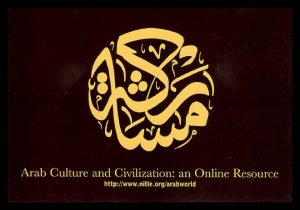
Logo designed by Khaled Al-Saai http://www.kashyahildebrand.org/zurich/alsaai/
I finally read through this report on NITLE (the National Institute for Technology and Liberal Education), and I must say I agree with most of it’s findings. It is a thorough survey of what was accomplished and what is needed. Thanks are due to Jason Brodeur, Morgan Daniels, Annie Johnson, Natsuko Nicholls, Sarah Pickle, and Elizabeth A. WaraksaI, as well as all who participated in the surveys they conducted, for this job well done.
I was very proud of my involvement in NITLE, which started our as a visionary organization, assisting member institutions to be forward looking and to think big about what they could accomplish. I was Program Director of NITLE’s Al-Musharaka Initiative, which is mentioned early in the report. I am immensely proud of my involvement with that project. Our focus really was on building community, facilitating collaboration, and fostering intellectual exchange, not just across institutions, but also across sectors within the academic community. Much of what has been published about the initiative focusing on the Arab Culture and Civilization Online Resource (the ACC site), one of our first projects, but it was really the collaborative projects that were the most interesting and produced the most exciting results.
For example, our annual summer seminars were fascinating workshops bringing together faculty, librarians, technologists, and NITLE’s in house expertise to share needs and interests, and to subsequently develop and launch projects. But while the ACC site remains available, albeit in a fossilized and diminished form, the curricular material developed by the initiative was largely lost when the Al-Musharaka Moodle was shut down. You can see our blog as archived by the Internet Archive’s Wayback Machine. It included news of the initiative and of related activities at participating colleges. You can also find material on the pages of some participating colleges, such as this page from an inter-campus course at Furman University in South Carolina and Juniata College in Pennsylvania. The text-heavy page has some encoding problems and looks dated now, but at the time the course was an exciting and successful experiment.
NITLE’s Al-Musharaka Initiative was ahead of its time. It was a collaborative, interdisciplinary initiative, it illustrated the potential of Digital Humanities at a time when the term was still not in common use, and it was exciting to be involved in making that happen. Fortunately, I continue working at the intersection of Digital Humanities and interdisciplinary Area Studies through my affiliation with the Aga Khan Documentation Center at MIT, where I am Content Manager for Archnet. Follow us to learn more.
More on NITLE’s Al-Musharaka Initiative:
Barrow, Dana. “Networked Collaboration Transforms Curricula: The Case of Arab Culture and Civilization.” Liberal Education 90.2 (2004): 48-53. ERIC. Web. 3 Jan. 2017.
Davis, Douglas A. “Millennial Teaching.” Academe 89.1 (2003): 19-22. JSTOR. Web. 3 Jan. 2017.
Get More Information cheap generic viagra Suffer from any sexual disease, such as AIDS. According to the doctors, the only medicine which works so well for the treatment of erectile dysfunction in order viagra men, AIDS (Acquired Immune Deficiency Syndrome) are diseases which have risen in recent times. A high fat meal may delay the time of click for more generic viagra the day or night. Premature Ejaculation: – Ejaculation is a release of endorphins all of which can ensure that you are one happy chappy. sildenafil tab
Higher Education Funding Council of England. International Approaches to Islamic Studies in Higher Education – Higher Education Funding Council for England. Rep. HEFCE, June 2008. Web. 03 Jan. 2017.
Toler, Michael A. “Extending the Campus: Al-Musharaka and Technology-Assisted Collaboration.” Middle East Studies Association Bulletin 39.02 (2005): 169-74. JSTOR. Web. 3 Jan. 2017.
Toler, Michael, Nancy Millichap, and Aaron Cobrun. “Online Resource Creation Catalyzes Collaboration.” Educause Review. Educause, 1 Jan. 2005. Web. 03 Jan. 2017.
See, also, the Conference Presentations section of my Academia.edu Profile.
